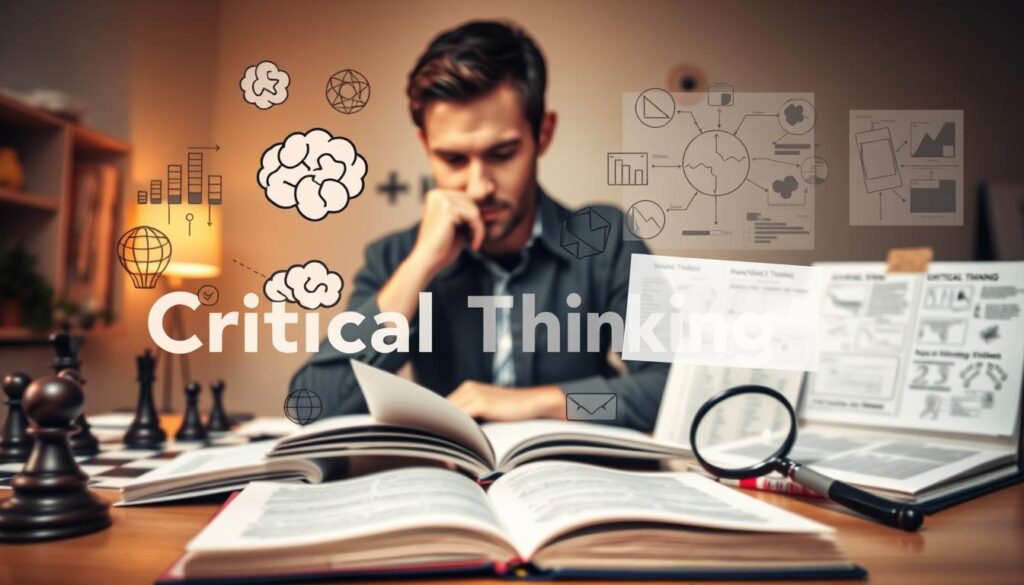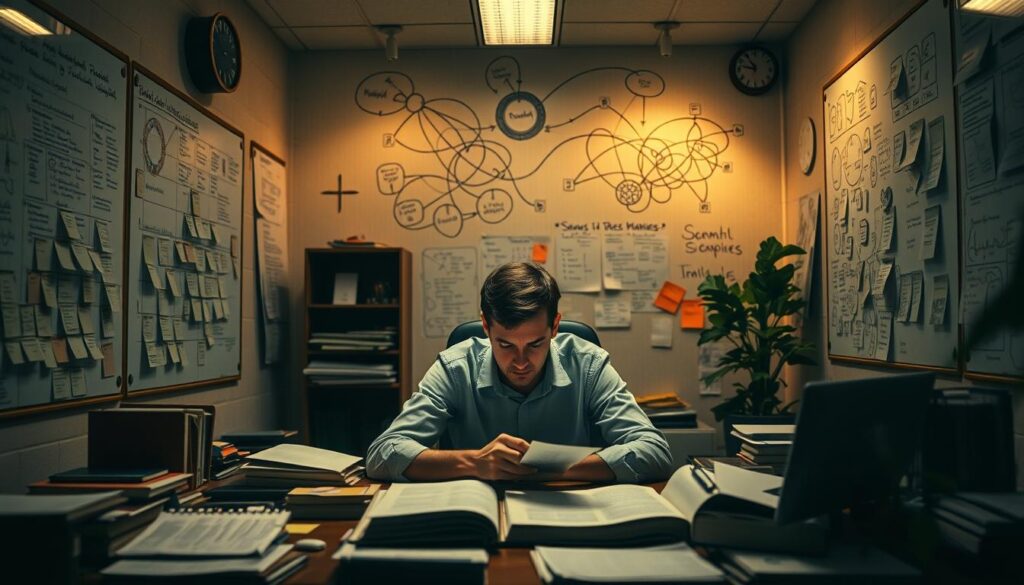In today’s fast world, making smart choices is key. As I face daily challenges, I see how critical thinking is vital for success.
Improving your logical reasoning and problem-solving skills helps you make better choices. This guide will show you how to boost your critical thinking. You’ll be ready to handle any challenge with confidence.
Key Takeaways
- Understand the importance of critical thinking in everyday life.
- Learn techniques to improve your logical reasoning.
- Discover how to apply problem-solving skills in real-world scenarios.
- Develop a systematic approach to decision-making.
- Enhance your ability to analyze information effectively.
Understanding Critical Thinking
Critical thinking helps us understand the world by sorting truth from lies. It’s more than a skill; it’s a way of thinking that helps us deal with life’s challenges.
Definition of Critical Thinking
Critical thinking means carefully checking information and ideas to make a decision. It’s about looking at things from different angles and using evidence to decide. It shows the value of being open-minded and not rushing to conclusions.

Importance in Everyday Life
Critical thinking is key in our daily lives. It helps us make smart choices, solve problems, and see things from other people’s viewpoints. It’s important for checking news, making money decisions, and judging social media info. By using critical thinking, we can get better at analyzing and thinking on our feet, leading to success in work and life.
Myths About Critical Thinking
There are many myths about critical thinking. One is that it means being negative or argumentative. But real critical thinking is about being fair and open to all views. Another myth is that it’s only for certain jobs or school. But critical thinking helps everyone, improving how we solve problems and make choices.
The Components of Critical Thinking
Critical thinking is made up of several key parts that help us make smart choices. Knowing these parts is key to getting better at critical thinking.

Analysis
Analysis breaks down big information into smaller bits for better understanding. It finds patterns and connections. For example, in data analysis, being good at analyzing helps us make smart choices.
Evaluation
Evaluation checks if information is trustworthy and useful. It’s about making smart choices based on solid evidence. Good evaluation means looking at all sides and avoiding biases. By improving our logical reasoning, we can make better judgments.
Inference
Inference is about making smart guesses from what we know. It uses both analysis and logic to reach a good conclusion. This skill is important for solving problems.
Explanation
Explanation makes complex ideas easy to understand. It’s about sharing information clearly. A good explanation is short, organized, and easy to get. This skill helps us share our ideas well.
In summary, critical thinking includes analysis, evaluation, inference, and explanation. These parts help us make smart choices and solve tough problems. By improving these skills, we become better at thinking critically.
Self-Assessment: Evaluating My Critical Thinking Skills
To get better at critical thinking, I need to know where I am. It’s key to understand my good points, what I need to work on, and use tools for a full check-up.
Identifying Strengths
Knowing my strong points in critical thinking is as important as knowing my weak ones. It helps me see what I’m good at and how to use these skills more. For example, I might be great at analyzing complex information or at evaluating different perspectives. Knowing this lets me use these skills better in my life and work.
Recognizing Weaknesses
It’s also important to know where I’m not as strong. This means being honest about where I struggle, like evaluating evidence, avoiding biases, or drawing logical conclusions. Once I know these areas, I can start working on getting better.
Tools for Assessment
There are many tools and ways to check how good I am at critical thinking. Using self-assessment questionnaires or critical thinking tests is a good way. These tools help me see how well I can analyze, solve problems, and make smart choices.
| Tool | Description | Benefit |
|---|---|---|
| Self-Assessment Questionnaires | These are structured questionnaires designed to evaluate an individual’s critical thinking skills. | Provides a personalized assessment of strengths and weaknesses. |
| Critical Thinking Tests | Standardized tests that measure critical thinking abilities. | Offers a comparative analysis of critical thinking skills. |
| Reflective Journaling | The practice of recording thoughts, experiences, and insights to reflect on them. | Enhances self-awareness and understanding of personal thought processes. |
By using these tools and methods, I can really understand my critical thinking skills. I can see where I need to get better and learn to think more strategically about problems.
Techniques to Enhance Critical Thinking
To get better at critical thinking, it’s key to use methods that boost cognitive flexibility. Cognitive flexibility lets you switch between different ways of thinking, adapt to new info, and handle complex situations. This skill helps you analyze info, evaluate evidence, and make smart choices.
There are many ways to improve critical thinking. You can use questioning techniques, reflective journaling, and mind mapping, among others. Let’s dive into these methods.
Questioning Techniques
Using questioning techniques is a great way to sharpen your critical thinking. It means questioning assumptions, looking for more info, and thinking about different views. Asking the right questions can reveal new insights and deepen your understanding.
- What are the underlying assumptions?
- What evidence supports the conclusions?
- What are the implications of the findings?
For example, when reading a news article, you might ask: “What’s the source of this info?” or “Are there any biases in the reporting?” This helps you grasp the topic more fully.

Reflective Journaling
Reflective journaling is a powerful tool for boosting critical thinking. It means writing down your thoughts, experiences, and insights regularly. Reflection helps you spot patterns, solidify learning, and gain a critical view of your experiences.
Keeping a reflective journal lets you:
- Make sense of your thoughts and feelings about a topic.
- Find areas to improve and plan for change.
- See how you’ve grown over time and adjust your approach.
“The important thing is not to stop questioning. Curiosity has its own reason for existence.”
Mind Mapping
Mind mapping is a visual method for organizing info, exploring idea connections, and sparking creativity. It lets you visually arrange your thoughts and spot key concepts and links.
Mind mapping involves:
- Starting with a central idea or concept.
- Expanding to related ideas and subtopics.
- Using colors, symbols, and images to boost memory and creativity.
By using these techniques, you can greatly improve your critical thinking skills. This leads to better problem-solving and more informed choices.
Incorporating Critical Thinking in Daily Activities
Using critical thinking skills helps me make better decisions and solve problems. It’s not just for work; it’s important every day. Critical thinking is key to navigating life’s challenges.
It lets me tackle daily tasks with a clear, systematic mind. Whether it’s making choices, solving problems, or understanding news, critical thinking is vital. It helps me handle complex situations.
Decision Making
Critical thinking is essential for making decisions. It means looking at all the facts, spotting biases, and seeing different viewpoints. This way, I can choose wisely, avoiding emotional or biased choices.
For example, when deciding, I weigh the pros and cons of each option. I think about what might happen next and check if the info is reliable. This method leads to better choices.
Problem Solving
Critical thinking is also vital for solving problems. It lets me break down big issues into smaller parts and find creative solutions. By using critical thinking, I can tackle complex problems effectively.
I often ask questions like “What’s the real problem?” or “What could happen with each solution?” This helps me find the best solution and think about what might happen next.
Analyzing News and Information
In today’s world, critical thinking is key for understanding news and info. With social media, it’s easy to find false or biased info. Critical thinking helps me check if sources are trustworthy, spot biases, and make smart choices about what I read.
For instance, when reading news, I check if the source is reliable and look at different views before I decide. This keeps me informed and helps me make better choices.
The Role of Curiosity in Critical Thinking
Curiosity is key in today’s complex world. It drives us to explore, question norms, and seek knowledge. This curiosity boosts our critical thinking skills.
Being curious means being open to new experiences and views. It makes us think more critically and openly. This includes asking questions, looking at different viewpoints, and being okay with not knowing everything.
Asking “Why?”
Curiosity makes us ask questions, like “why?” This simple question helps us understand things better. It challenges our assumptions and deepens our knowledge.
- It helps find the root of problems.
- It leads to a deeper understanding.
- It encourages exploration and inquiry.
Seeking New Perspectives
Curiosity also makes us look for new views and experiences. By doing this, we gain empathy and knowledge. We can meet people from different backgrounds, read various books, or explore cultures.
Benefits of seeking new perspectives include:
- More empathy and understanding.
- Increased creativity and innovation.
- Better decision-making with multiple views.
Embracing Uncertainty
Being okay with not knowing everything is part of curiosity. It lets us tackle complex problems and adapt to changes. This mindset is key to navigating the unknown.
By embracing uncertainty, we can:
- Be more flexible and adaptable.
- Be resilient in uncertain times.
- Encourage learning and experimentation.
In summary, curiosity is essential for critical thinking. It helps us ask questions, explore new views, and handle uncertainty. By nurturing curiosity, we improve our critical thinking and become more open and informed.
Overcoming Barriers to Critical Thinking
To think critically, we must first tackle the obstacles that block our logical and strategic thinking. Critical thinking helps us make smart choices and solve tough problems. It’s a skill we all need.
Implicit Biases
Implicit biases are unconscious attitudes or stereotypes that shape our judgments. They can lead to unfair treatment of others. To beat these biases, we must reflect on our own thoughts and biases.
I once had to choose candidates from different backgrounds. Knowing my biases helped me make a fair choice. Building mental toughness also helped me stay objective under pressure.
Emotional Interference
Our emotions can cloud our critical thinking. Stress or strong feelings can lead to hasty decisions. Using techniques like mindfulness and meditation can help manage these emotions.
By practicing these methods, we can stay calm and focused, even when things get tough. This improves our critical thinking skills.
Resistance to Change
Another barrier is our resistance to new ideas. When faced with information that challenges our beliefs, we might resist. Being open-minded and questioning our assumptions can help us overcome this.
| Barrier | Description | Strategy to Overcome |
|---|---|---|
| Implicit Biases | Unconscious attitudes or stereotypes affecting judgments | Self-reflection and awareness |
| Emotional Interference | Emotions clouding judgment and leading to impulsive decisions | Emotional regulation techniques like mindfulness |
| Resistance to Change | Resisting new information or ideas that challenge existing beliefs | Cultivating an open-minded attitude |
In conclusion, beating barriers to critical thinking is key for making good decisions and solving problems. By tackling implicit biases, emotional interference, and resistance to change, we can boost our logical and strategic thinking.
Collaborative Thinking: Working with Others
Thinking together is key to solving problems and making decisions. When we work together, we share our knowledge and skills. This helps us reach our goals more effectively.
Collaborative thinking uses strategies like group talks, brainstorming, and feedback from peers. These methods help us understand issues better and find new solutions.
Group Discussions
Group talks are at the heart of working together. They let us share our views, question assumptions, and build on each other’s ideas. Good group talks need active listening, being open-minded, and accepting different opinions.
Peter Senge said, “When people talk about their best times, they often mention being in a group. It’s about working together, trying to understand each other.”
Brainstorming Sessions
Brainstorming is another great way to think together. It’s about coming up with lots of ideas without worrying about what others think. This way, we can be creative and find new solutions.
Peer Feedback
Getting feedback from others is important in collaborative thinking. It helps us improve our ideas and approaches. Feedback lets us see our blind spots, make our thinking clearer, and do better work.
In summary, working together is essential for solving problems and making decisions. By talking in groups, brainstorming, and getting feedback, we can use everyone’s ideas to get better results.
Lifelong Learning and Continuous Improvement
Staying adaptable in a changing world means embracing lifelong learning. As I grow my critical thinking, I see the value in ongoing education. This helps me think strategically and make better decisions.
Pursuing Ongoing Education
Looking for educational chances is key to lifelong learning. I do this by going to workshops, seminars, and online courses. These help me learn more and keep up with new trends in my field.
Engaging with Others
Talking with others about ideas is great for growing critical and strategic thinking. Sharing my views helps me learn from others and question my own thoughts.
Staying Informed
Keeping up with current events is important for my critical thinking. I follow trusted news sources and think deeply about what I read. This helps me form my own opinions.
FAQ
What is critical thinking, and why is it important?
Critical thinking means carefully checking and analyzing information and ideas. It helps us make smart choices, solve tough problems, and deal with lots of information.
How can I develop my critical thinking skills?
To get better at critical thinking, you need to practice, be patient, and keep trying. Try questioning, journaling, and mind mapping. Also, doing things like analyzing data and thinking strategically can help.
What are some common barriers to critical thinking?
Barriers to critical thinking include biases, emotions, and not wanting to change. Knowing these and working to beat them can boost your critical thinking.
How can I incorporate critical thinking into my daily life?
You can use critical thinking in everyday life, like when making choices, solving problems, or looking at news. Being more thoughtful and intentional can help you think more critically.
What is the role of curiosity in critical thinking?
Curiosity is key in critical thinking. It makes you ask questions, look at things from different angles, and explore new ideas. Being curious helps you think more openly and critically.
How can collaborative thinking benefit my critical thinking skills?
Working together, like in group talks or brainstorming, can give you new views and challenge your ideas. It helps improve your critical thinking.
Why is lifelong learning important for maintaining critical thinking skills?
Keeping up with learning is vital for critical thinking. By always learning, talking about ideas, and staying current, you keep challenging yourself and growing your critical thinking.
How can I assess my critical thinking skills?
To check your critical thinking, look at what you’re good at and what you need to work on. Use tools like self-assessment rubrics, journaling, and feedback from others.
What are some strategies for overcoming emotional interference in critical thinking?
To beat emotional interference, first, recognize and accept your feelings. Then, step back and reflect. Also, seek out different views to get a well-rounded understanding.



